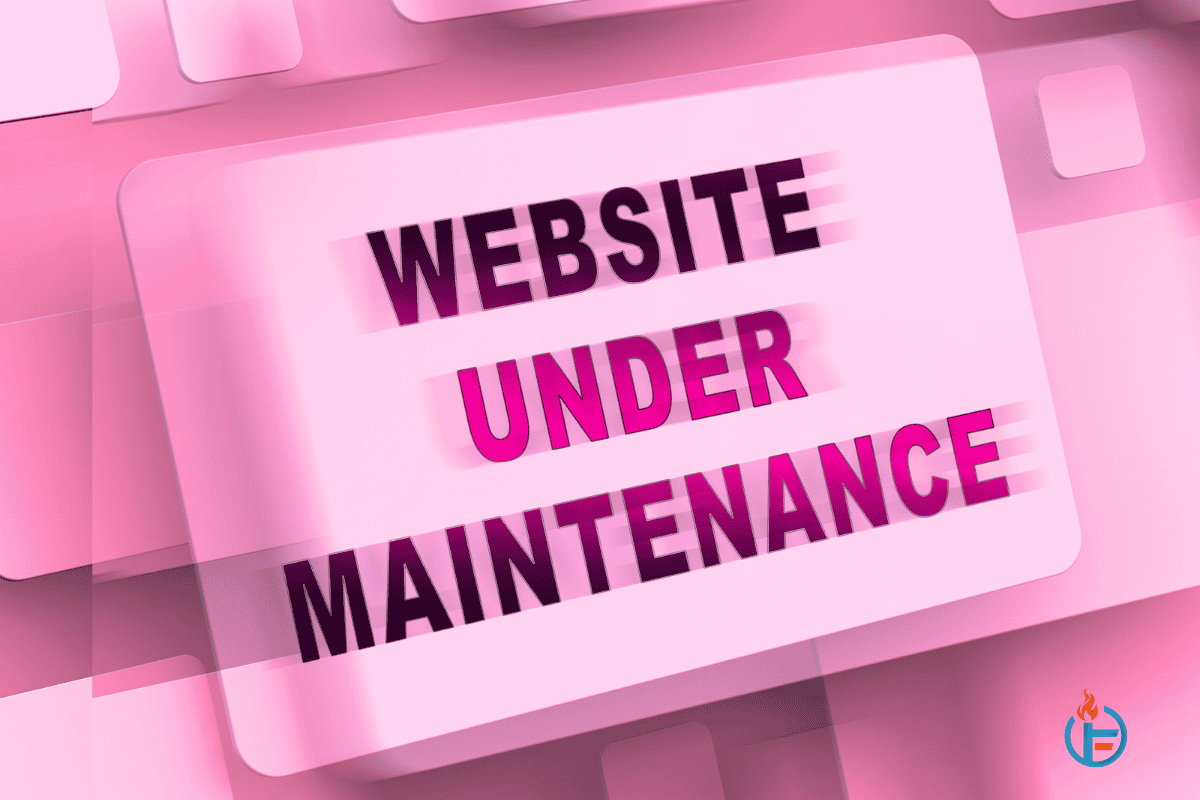Do you know the importance of website maintenance and how it can protect your site from cyberattacks while keeping it running smoothly?
Your website is the first impression potential customers have of your business. A well-maintained website is critical not just for user experience but also for security, performance, and staying relevant in your industry. Regular website maintenance is the key to keeping your site secure, optimized, and efficient. If you fail to maintain your site, you’re not just risking poor performance—you’re also leaving it vulnerable to cyberattacks, which could cost you far more than just downtime.
In this article, we’ll explore the importance of website maintenance and why it should be a top priority for every website owner. We’ll dive into key maintenance tasks, discuss the risks of neglecting your website, and share how professional services can help ensure your website is always running at its best.
What is Website Maintenance?
Website maintenance refers to the routine tasks that are performed to keep your website running smoothly. This includes fixing bugs, updating software, backing up data, and ensuring security measures are in place. Maintaining a website is an ongoing process, not a one-time task, and it’s essential to perform these tasks regularly to ensure that your site functions efficiently and securely.
Key maintenance tasks include:
- Updating Software and Plugins: Outdated software can create vulnerabilities, leading to cyberattacks or poor performance.
- Backing Up Data: Regular backups ensure that you can recover your website in case of data loss.
- Checking for Broken Links: Broken links can damage your SEO and user experience.
By performing these routine maintenance tasks, you can prevent issues before they affect your website’s functionality and keep it running smoothly for visitors.
Why is Regular Website Maintenance Crucial?
1. Security
One of the most important reasons for regular website maintenance is to protect your website from cyberattacks. Hackers are constantly looking for vulnerabilities in outdated software, plugins, or security systems. If you don’t stay on top of updates, your site could be at risk of being hacked, resulting in lost data or compromised customer information.
To ensure that your website is secure:
- Install security patches as soon as they are available.
- Use tools to monitor suspicious activity.
- Regularly update all security features on your site.
Failing to keep your website secure can lead to significant financial loss, especially if sensitive customer information is stolen.
2. Improved User Experience
A well-maintained website improves the overall user experience. Slow loading times, broken links, and outdated content frustrate visitors, leading them to abandon your site for competitors. By performing regular website maintenance, you can ensure your site loads quickly, is easy to navigate, and provides valuable, up-to-date information.
Consider these user experience improvements:
- Optimize page speed by compressing images and removing unnecessary scripts.
- Regularly update your content to ensure accuracy and relevance.
- Fix broken links to ensure seamless navigation.
Keeping your website user-friendly helps improve your conversion rates and keeps visitors engaged.
3. SEO Benefits
Search engines like Google reward well-maintained websites with higher rankings. Regularly updating content, fixing broken links, and optimizing for speed all contribute to better SEO performance. Google favors websites that provide a good user experience and meet modern web standards.
Here’s how website maintenance impacts SEO:
- Speed optimization helps your website rank higher in search engine results.
- Fixing broken links and removing 404 errors enhances your site’s credibility.
- Fresh, updated content signals to search engines that your site is relevant.
Without regular maintenance, your rankings will drop, making it harder for potential customers to find your business online.
4. Cost Efficiency
Neglecting website maintenance can lead to costly repairs in the future. Small issues that go unchecked—such as unpatched software vulnerabilities or outdated plugins—can lead to major problems down the road, requiring expensive fixes or a complete site rebuild.
Investing in routine maintenance can help prevent these costly issues. Instead of waiting for a crisis, proactively maintaining your site ensures that any potential problems are addressed before they become serious.

Key Website Maintenance Tasks
1. Updating Software and Plugins
Outdated software is a major vulnerability for websites. Regular updates are crucial for security and performance. CMS platforms like WordPress release frequent updates to patch vulnerabilities and enhance features. Not updating your CMS or plugins can leave your site open to malware and hacking.
2. Backing Up Your Website
Data loss can happen at any time due to hacking, server failures, or accidental deletions. Backing up your website regularly ensures that you can quickly restore it to its previous state if something goes wrong. Many website hosting providers offer automatic backup solutions, but you should always double-check to make sure your backups are current.
3. Improving Website Speed
Website speed is a critical factor for both user experience and SEO. Google prioritizes fast-loading websites in search results, and users are more likely to leave a slow site. To improve your site’s speed:
- Compress large images.
- Use a content delivery network (CDN).
- Remove unused plugins and code.
Optimizing your site’s speed will enhance both your SEO rankings and user engagement.
4. Checking for Broken Links
Broken links can harm your website’s credibility and SEO. Regularly checking for and fixing broken links ensures that your visitors can navigate your site without running into dead ends. Tools like Google Search Console can help identify broken links so you can fix them promptly.
How Regular Website Maintenance Improves Security
Cybersecurity is a growing concern for businesses of all sizes. Hackers and malicious bots are constantly trying to exploit vulnerabilities, and without routine maintenance, your site could be an easy target. Regularly updating your website’s software and security protocols will help:
- Prevent unauthorized access.
- Protect sensitive data.
- Ensure compliance with data protection regulations.
According to a study by Cybersecurity Ventures, cybercrime is expected to cost the world $10.5 trillion annually by 2025. Regular website maintenance is one of the simplest ways to reduce your risk of becoming a victim of these cyberattacks.
Different Types of Website Maintenance
There are various types of website maintenance, each serving a different purpose:
1. Preventative Maintenance
This involves proactively updating your website and fixing potential vulnerabilities before they become problems. Examples include updating plugins, optimizing page load times, and conducting security scans.
2. Corrective Maintenance
Corrective maintenance focuses on fixing issues as they arise, such as resolving errors and bugs on your site. It’s essential to monitor your website for any issues and address them promptly to prevent larger problems.
3. Adaptive Maintenance
As web technologies evolve, adaptive maintenance involves making changes to ensure your website stays compatible with new technologies and trends. This may include ensuring your website is mobile-friendly or implementing new design standards.
4. Perfective Maintenance
Perfective maintenance focuses on improving the performance and user experience of your site. This can include enhancing design, optimizing content for SEO, or integrating new features to keep your website engaging and functional.
How Much Does Website Maintenance Cost?
The cost of website maintenance can vary widely depending on the complexity of your website, the size of your business, and the services required. For small businesses, the cost can range from $50 to $300 per month, while larger, more complex websites may require higher monthly maintenance costs.
The cost factors include:
- Frequency of updates and backups.
- Security monitoring.
- Software/plugin updates.
- Content updates.
For more insight into costs, check out The Cost of Building a Small Business Website in 2024.
How to Create a Website Maintenance Plan
Creating a website maintenance plan is essential for ensuring your site stays secure, up-to-date, and running smoothly. Here’s how to build a plan:
- Assess Your Website’s Needs: Identify what specific tasks your website requires regularly.
- Set a Maintenance Schedule: Establish how often updates, backups, and security checks should be performed.
- Prioritize Security: Always include regular security scans and updates in your plan.
- Monitor Performance: Use tools like Google Analytics to monitor your website’s performance and spot issues early.
Need help creating a plan? Check out Innovative Flare’s website maintenance services.
Neglecting Website Maintenance: What Are the Risks?
Neglecting website maintenance can lead to a range of problems, including:
- Security breaches: Outdated software is an easy target for hackers.
- Loss of traffic: Slow loading speeds and broken links can drive users away.
- SEO penalties: Search engines may penalize your site for not meeting modern web standards.
Routine maintenance can prevent these issues, saving you from costly repairs and lost business opportunities.
Benefits of Hiring a Professional Website Maintenance Service
Outsourcing website maintenance to professionals can save time and ensure your site is always up-to-date and secure. Professional services can offer a wide range of tasks, including:
- Regular backups.
- Software/plugin updates.
- Security monitoring.
- Performance optimization.
If you’re struggling to maintain your website, consider hiring a professional to handle it for you. Explore Innovative Flare’s website maintenance packages for comprehensive support.
The Importance of Website Maintenance for Your Business
Ensuring your website stays up-to-date is crucial for business success. At Innovative Flare, we provide professional website maintenance services to keep your site secure, fast, and functional. Whether you need regular backups, security monitoring, or software updates, our team is here to help.
Contact us today for a free consultation and let us help you protect your website from cyberattacks and optimize it for success.
FAQ: The Importance of Website Maintenance
Q1: Why is website maintenance important for SEO?
A: Regular website maintenance ensures your site is optimized for speed, security, and user experience, all of which contribute to higher SEO rankings.
Q2: What is included in website maintenance?
A: Maintenance tasks include updating software and plugins, backing up data, optimizing speed, and fixing broken links.
Q3: How often should I perform website maintenance?
A: A well-maintained website requires weekly or monthly updates, depending on its complexity and activity level.
Q4: What are the costs of website maintenance?
A: The cost of website maintenance can range from $50 to $300 per month for small businesses, depending on the services required.
Q5: How does website maintenance help prevent cyberattacks?
A: Routine updates and security scans can help identify vulnerabilities and protect your site from cyberattacks.
Q6: Can I perform website maintenance myself?
A: Yes, but it’s time-consuming and requires technical knowledge. Hiring a professional ensures that all necessary tasks are covered.
Q7: What happens if I neglect my website maintenance?
A: Neglecting maintenance can lead to security vulnerabilities, loss of traffic, poor SEO rankings, and even website downtime.
Q8: How do I find the right website maintenance service?
A: Look for services that offer comprehensive support, including backups, security monitoring, and updates. Be sure to review their track record and customer testimonials.
Q9: How can website maintenance improve user experience?
A: Regular updates ensure that your site remains fast, easy to navigate, and relevant, enhancing the overall experience for visitors.
Q10: What tools are available for website maintenance?
A: Tools like Google Search Console, Wordfence (for security), and Squoosh (for image compression) are great for maintaining your website.
This blog post covers everything you need to know about the importance of website maintenance and why it should be a priority for every business. By staying on top of maintenance tasks, you can improve security, performance, and user experience, ensuring your website stays ahead of the competition.
If you’re ready to start, contact Innovative Flare today to discuss your website maintenance needs.
 seolounge
seolounge

